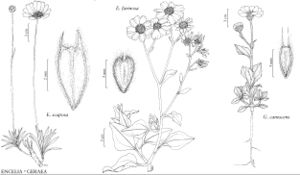Encelia
Fam. Pl. 2: 128. 1763.
| Taxon | Illustrator ⠉ | |
|---|---|---|
 | Encelia scaposa Encelia farinosa Geraea canescens | Yevonn Wilson-Ramsey Yevonn Wilson-Ramsey Yevonn Wilson-Ramsey |
Perennials, subshrubs, or shrubs (10–) 30–150 cm. Stems erect, usually branched from bases, often throughout (scapiform in E. nutans and E. scaposa). Leaves usually cauline, sometimes basal (E. nutans and E. scaposa); alternate (usually drought-deciduous); petiolate (obscurely in E. scaposa); blades (1-nerved or 3-nerved) mostly deltate, lanceolate, rhombic, or ovate (narrowly oblanceolate to linear in E. scaposa), bases broadly to narrowly cuneate, margins usually entire, rarely toothed, face glabrous or canescent, hirtellous, scabrellous, strigose, or tomentose, often glanddotted as well. Heads radiate or discoid, borne singly or in ± paniculiform arrays (peduncles usually longer than involucres). Involucres ± hemispheric or broader, 4–22 mm diam. Phyllaries persistent, 18–30 (–50+) in 2–3+ series (subequal to unequal, outer shorter). Receptacles flat or convex, paleate (paleae ± conduplicate, folded around and falling with cypselae). Ray-florets 0 or 8–25 (–40), neuter; corollas yellow. Disc-florets 80–100 (–200+), bisexual, fertile; corollas yellow or brown-purple, tubes shorter than to equaling abruptly expanded throats, lobes 5, triangular. Cypselae strongly compressed, obovate to cuneate (margins ciliate, apices usually ± notched except in E. scaposa, faces usually glabrous except in E. scaposa); pappi usually 0, sometimes readily falling or persistent, of 2 bristlelike awns. x = 18.
Distribution
sw United States, Mexico, South America
Discussion
Species 13 or 14 (8 in the flora).
Encelias commonly hybridize, especially in disturbed areas: Encelia farinosa × E. frutescens is common; E. farinosa × E. californica, E. farinosa × E. actoni, E. actoni × E. frutescens, E. frutescens × E. virginensis, and E. farinosa × Geraea canescens have been reported.
Selected References
Lower Taxa
Key
| 1 | Perennials; leaves all or mostly basal | > 2 |
| 1 | Subshrubs or shrubs; leaves cauline | > 3 |
| 2 | Ray florets 20–40 | Encelia scaposa |
| 2 | Ray florets 0 (heads nodding in fruit) | Encelia nutans |
| 3 | Ray florets 0 | Encelia frutescens |
| 3 | Ray florets 8–25 | > 4 |
| 4 | Heads in paniculiform arrays; leaves tomentose to strigose | > 5 |
| 4 | Heads borne singly; leaves glabrous or canescent, scabrous, and/or strigose (not tomentose) | > 6 |
| 5 | Leaves tomentose (branching among heads mainly distal; ray florets 11–21, corolla laminae 8–12 mm) | Encelia farinosa |
| 5 | Leaves tomentose to strigose (branching among heads mainly proximal; ray florets fewer and smaller) | Encelia farinosa × E. frutescens (see Encelia farinosa) |
| 6 | Leaves glabrous or glabrate; disc corollas brown (ray laminae lengths 1.5–2 times disc diams.) | Encelia californica |
| 6 | Leaves scabrous, strigose, and/or canescent; disc corollas yellow (ray laminae lengths 1–1.2 times disc diams.) | > 7 |
| 7 | Leaves scabrous to strigose (not canescent) | Encelia resinifera |
| 7 | Leaves canescent, sometimes strigose as well | > 8 |
| 8 | Leaves sparsely canescent and strigose; rays 11–21, laminae 8–15 mm (relatively deeply toothed) | Encelia virginensis |
| 8 | Leaves ± silvery-canescent (not strigose); rays 14–25, laminae 10–25 mm (relatively shallowly toothed) | Encelia actoni |
"broader" is not a number.